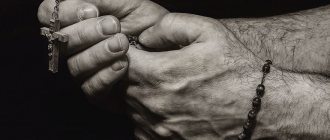- 19130
- 05-09-2018
- Author: Mysekret Team
- 0
Of all the church rites, repentance and communion are among the most important in the life of every Christian who considers himself to be of the Orthodox faith. But great responsibility requires careful, scrupulous preparation, the most important components of which are prayers before confession and communion.
Why pray before communion?
How to tell God what is on your soul? Of course, with the help of prayer. This is how we communicate with higher powers, share our experiences with them, ask for help or express gratitude. If what weighs on the soul remains unexpressed, a person becomes despondent and feels unhappy. This often affects his loved ones, career, communication with friends and personal life. There is no need to accumulate worries in yourself; it is better to voice them, even if it is a conversation with yourself or prayer.
Orthodox prayers before confession and communion are not a duty, not a punishment for wrongdoing, and not an obligation. Moreover, if you perceive them this way, then it is definitely too early for you to learn the Sacrament of Communion. You should not adhere to the canons if the spirit does not require it. Any violence against oneself in this matter is a sign that a person is not morally ready for change.
See also...
✅ Damage to death: signs, methods of removal
✅ Prayer before starting and after finishing a task
✅ Prayers before and after eating food
✅ Orthodox prayers for the departed
Prayers for confession and communion (especially the second) in the Orthodox world are obligatory, but are read only if the communicant is completely confident in his choice and decision. The prayer before Communion includes three Canons (see below) and is said the day before, before the images before going to bed. But prayer at home should not replace communion in church. The recitation of the holy text in the house of God passes through other channels and brings special spiritual peace to the worshiper, also being an expression of respect for religion and faith.
RESPONSIBILITIES TO ALL GOD'S CREATION
Have you taken the mission entrusted to you by God to “cultivate and preserve” the nature He created with sufficient responsibility? (cf. Gen 2:15) Have you treated natural resources with care? Have you been cruel to animals? Did you destroy nature out of carelessness or for the sake of idle fun?
When completing the examination of conscience, you should draw some conclusions for yourself:
Is there progress in your spiritual life? Have you improved in the period since your last confession? Have you experienced spiritual and moral decline? If so, what exactly? What sins did you most often commit during this time? What is the root of these sins? What is your main weakness? How did you fight him? How are you going to overcome it?
Preparing for Confession
If you feel that preparing for repentance does not contain any difficulties, then think twice. Sins already committed must be voiced so that there is no doubt about your sincere repentance. In the words of confession there is strength to fight the sins of the future. The offense itself is not only a serious violation of Orthodox canons, but even a thought in which you diverged from the will of God.
None of us is perfect, so in our daily life we are haunted by hundreds of temptations. The temptation of self-delusion, which is considered a serious sin, is especially great. To repent means to desire a change of soul . The way you confess will be the basis for complete repentance. You cannot confess badly or well: everything is determined by the measure of self-awareness and natural desire for change without coercion.
What should a confession contain? Let's list the main things:
- List of committed sins. It is unacceptable to conceal or hush up any facts - this way you are deceiving not only God, but also yourself.
- If it is difficult to imagine how to repent, read the corresponding biographies from the lives of the blessed - for example, St. Theodora.
- To voice a sin is not only to confess it, but also to release it to repentance, so confession without saying what you want out loud will not be complete.
- Try to maintain your fortitude. Strong crying is dangerous due to self-delusion and excessive self-pity. When you burst into tears, you do not repent, but only give vent to your feelings and fall into selfishness.
- If you are afraid that you will forget about any sins during confession, do not hesitate to make a list of them in advance.
- First, voice those offenses that are most difficult for you to remember. What causes us the most discomfort and shame is the most damaging to the soul. But the total weight of small sins is sometimes heavier than the joint “terrible” sins.
- Remember that you are repenting to the Almighty, and not asking for forgiveness for one specific sin or several offenses. Simply listing them is the wrong step. You should feel repentance, and not try to hit it “mechanically”, tritely pronouncing the names of sins out loud.
- A detailed confession is not an abundance of unnecessary words. Be meaningful, but don't go wild with your thoughts. Try to speak clearly, carefully, think about your words, and construct complete sentences. But talking about the sins committed is unnecessary.
- Justifying yourself is bad manners. God must forgive you.
To tune in to the desired spiritual mood and enter a grace-filled trance, the following prayer is said before confession:
“God and Lord of all! You who have the power of every breath and soul, who alone is able to heal me, hear the prayer of me, the accursed one, and the serpent nesting in me by the influx of the All-Holy and Life-Giving Spirit, slaying: and for me, poverty and nakedness, all the virtues that exist, at the feet of my holy (spiritual) father with tears grant him the honor, and his holy soul, to be merciful, so that you may be merciful to me. And grant, Lord, in my heart humility and good thoughts, befitting a sinner who has agreed to repent to You, and may you not completely abandon the one soul that united with You and confessed You, and instead of the whole world chose and preferred You: weigh for, Lord, as I want to be saved, even if my evil custom is an obstacle: but it is possible for You, Master, the essence of everything, what is impossible is of man. Lord, help me to sincerely repent. Amen!"
Not a single confession will bring results if it is not supported by specific actions, and this must be remembered.
What prayers should I read before confession and communion?
Inexperience and fear of condemnation often prevent a person from properly preparing for repentance and communion. Some arrogantly rely on memory or horizons, which is why they look awkward during the process itself. It is one thing to have sincere intentions, but not have the necessary knowledge due to lack of experience. It’s quite another to consider yourself above asking knowledgeable people for help. Preparation for rituals includes mandatory reading of prayers . They provide an opportunity to plunge into an atmosphere of awe and feel it with all your soul. Before confession, you can say the prayer of Simeon the New Theologian in Church Slavonic:
“God and Lord of all, who has power over every breath and soul, is the only one who can heal me! Hear the prayer of me, the accursed one, and the serpent nesting in me, consume by the influx of the All-Holy and Life-Giving Spirit. And grant me, poor and naked, all virtues, to fall at the feet of my holy (spiritual) father with tears, and draw his holy soul to mercy, to have mercy on me. And grant, Lord, in my heart humility and good thoughts, befitting a sinner who has agreed to repent to You; and may not completely abandon the one soul that united with You and confessed You, and instead of the world chose and preferred You. Be aware, Lord, that I want to be saved, even if my evil custom is an obstacle: but what is possible for You, O Lord, is all that is possible; what is impossible is from man. Amen".
You can read prayers for Holy Communion by starting with the prayer book of St. John of Damascus . It is quite short, but contains everything you need to mentally prepare for communion:
“Sovereign Lord Jesus Christ, Our God, merciful and humane, who alone has the power to forgive the sins of people, despise (forget), forgive all my sins, conscious and unconscious, and grant me, without condemnation, to partake of Your divine, glorious, most pure and life-giving Mysteries as punishment, not for the multiplication of sins, but for cleansing, sanctification, as a pledge of future life and kingdom, as a strong stronghold, for protection and defeat of enemies, for the destruction of many of my sins. For YOU are the God of mercy and generosity, and love for mankind, and we glorify You with the Father and the Holy Spirit, now and ever, and forever and ever. Amen!"
If you need a prayer before communion and confession, the text of which includes gratitude to higher powers for assistance in this difficult process, it can be downloaded here.
Prayer to Saint Basil the Great
To repent of sins and ask for pardon for committed misdeeds, the fifth prayer of St. Basil the Great is read, which is included in the morning rule, mandatory for Orthodox believers:
“Lord Almighty, God of hosts and all flesh, living in the highest and looking down on the humble, testing the hearts and wombs and the innermost parts of men, the fore-foreseen One, the Beginning and Ever-Everlasting Light, He has no application, or transformation, overshadowing; Himself, Immortal King, accept our prayers, even now, boldly for the multitude of Your bounties, from the bad lips we create towards You, and forgive us our sins, whether in deed, word, or thought, knowledge or ignorance, we have sinned; and cleanse us from all filthiness of the flesh and spirit. And grant us with a cheerful heart and a sober thought to pass through the whole night of this present life, awaiting the coming of the bright and revealed day of Your Only Begotten Son, Lord and God and our Savior Jesus Christ, when the Judge of all will come with glory, to whom he will give to each according to his deeds; May we not fall and become lazy, but be watchful and raised up for the work that is to come, and prepare for the joy and Divine palace of His glory, where those who celebrate the unceasing voice and the ineffable sweetness of those who behold Your face, the ineffable kindness. For You are the true Light, you enlighten and sanctify all things, and all creation sings to You forever and ever. Amen!"
Prayer to Saint John Chrysostom
Before performing the rite of repentance and communion, be sure to memorize and repeatedly repeat the second prayer of John Chrysostom, which is included in the Follow-up to Holy Communion. Observe all accents correctly:
“Lord my God, we know that I am not worthy, below I am pleased, but under the roof of the temple of my soul, all empty and fallen, and there is no place in me worthy of bowing my head: but as from on high For our sake you humbled yourself, humble yourself even now to my humility; and as you received in the den and in the wordless manger of those who reclined, let us also take in the wordless manger my soul, and bring it into my defiled body. And just as you were not deigned to enter and shine from the sinners in the house of Simon the leper, so deign to enter into the house of my humble soul, lepers and sinners; and even though you did not reject a harlot and a sinner like me, who came and touched You, you were also compassionate about me, a sinner, who came and touched You; And just as you did not abhor her foul lips and unclean ones who kiss You, below mine, abhor the foul lips and unclean ones, below my vile and unclean walls, and the foul and unclean My oldest language. But may the coal of Your Most Holy Body and Your honest Blood be for me, for the sanctification and enlightenment and health of my humble soul and body, for the relief of the severity of my many sins, in observance from all the devil's actions, to drive away and forbid my evil and evil custom, for the mortification of passions, for the supply of Your commandments, for the application of Your Divine grace, and the appropriation of Your Kingdom. I do not come to You despisingly, O Christ God, but because I am bold in Your ineffable goodness, and let me not withdraw from Your fellowship, from the mental wolf I will be hunted down. Moreover, I pray to You: for the only Holy One, Master, sanctify my soul and body, mind and heart, wombs and wombs, and renew all of me, and root Your fear in my lands, and Your sanctification create inseparably from me; and be my helper and intercessor, nourishing my life in peace, conferring upon me and at Your right hand to stand with Your saints, prayers and supplications of Your Most Pure Mother, Your immaterial ones servants and most pure powers, and all the saints who have pleased You from time immemorial. Amen!"
Psalms before Communion
To ensure that the communion procedure takes place in accordance with church canons and does not violate established regulations, three psalms are also read, numbered 22, 23 and 115 . In the first psalm there is an appeal to the Lord, who gave life and guidance on the true path, mentioning the greatness of his will and all-embracing mercy. The staff and rod of the Lord are mentioned as weapons of defense for the believer:
“The Lord shepherds (leads) me and does not deprive me of anything. There, in a green place, He settled me and raised me by the still water. He converted my soul, directed me on the path of righteousness for the sake of His name. Even if I walk in the shadow of death, I will fear no evil, for You are with me: Your rod and Your staff - they have comforted me. You have prepared a table for me in view of my oppressors, You have anointed my head with oil, and Your cup gives me drink as if it were excellent! And Your mercy follows me all the days of my life. And I will abide in the house of the Lord many days!”
In religious chant No. 23, the beauty and power of the earth created by the Lord is glorified, the King of Glory is glorified:
“The earth is the Lord’s and all that fills it, the universe and all who live in it. He founded it on the seas and built it on the rivers. Who will ascend the mountain of the Lord? Or who will stand in His holy place? The one who has blameless hands and a pure heart, who in his soul was not carried away by vanity and did not swear deceitfully to his neighbor. This one will receive a blessing from the Lord and mercy from God his Savior. Such is the generation of those who seek the Lord, who seek the face of the God of Jacob! Princes, lift up your gates and stand up, everlasting gates! And the King of Glory will enter. Who is this King of Glory? The Lord is mighty and strong, the Lord is mighty in battle. Princes, lift up your gates and stand up, everlasting gates! And the King of Glory will enter. Who is this King of Glory? The Lord of hosts, He is the King of Glory.”
Reading Psalm 115 , express your full will to accept the will of God, rejecting all pride and repenting of your sins:
“I believed and therefore said: I am very broken. I said in my frenzy: every man is a liar. What shall I render to the Lord for all that He has given me? I will accept the cup of salvation and call on the name of the Lord. I will fulfill my vows to the Lord before all His people. The death of His saints is honorable before the Lord. God! I am Your servant. I am Your servant and the son of Your handmaid. You have broken my bonds. I will offer you a sacrifice of praise and call on the name of the Lord. I will fulfill my vows to the Lord before all His people, in the courts of the house of the Lord, in your midst, O Jerusalem!”
Prayer after examination of conscience
I repent of these and all my other sins, my Lord and God, and I sincerely regret that I offended with them You, my merciful and kind Savior. I humbly pray to You: forgive me everything that I have done, voluntarily or unwittingly, against Your commandments and Your holy will. Having firmly decided to avoid all sin, I trust in Your mercy and Your gracious help, strengthening me in every good deed. I hope that You will give it to me for the intercession of Your Most Pure Mother and all Your saints. Amen.
Reminder for those preparing for Holy Communion
The Sacrament of Communion cannot be performed without appropriate preparation. Prayer and repentance are the main stages of preparation, but they are not enough. If you fulfill the established regulations, this is welcome, but the whole way of life should be conducted according to the principles of the Gospel. The church and religion are full of forgiveness, but hypocrisy and the so-called “one-day holiness”, when adherence to the foundations of Christianity manifests itself spontaneously, in one second, are not welcomed too warmly. Especially if your past life was full of sinfulness. You need to desire change and unity with the Creator with all your soul, so that the message comes from its depths, and not from selfish motives or blind fear.
You can pray before communion in your home or in church. Anyone who wants to share the Holy Mystery of Christ must prepare his spirit for this by spending long hours in prayer and participating in worship in church. An evening service is attended immediately before the procedure.
Prayer preparation includes reading several special texts:
- Follow-up to Holy Communion;
- Canon of repentance to Christ;
- Canon of prayer to the Mother of God;
- Canon to the Guardian Angel;
- Akathist for Holy Communion.
If everything happens on Bright Week, you can replace the reading of the above prayers with the Easter canon. However, if you have free time, do not miss the opportunity to read all the akathists and canons.
Spiritual cleansing is necessarily reinforced by liturgical fasting. If you have fallen from the faith, have never fasted before, and are new to the faith, the priest may impose an additional restriction of a three-day or seven-day fast. Abstinence from fast food is not the only part of fasting . You should eat as modestly and moderately as possible, stop watching entertainment shows for a while, not attend game shows, and stop listening to secular music. If you live in a marriage, the day before and after Communion, do not engage in physical communication with your other half.
Half a day before communion, drinking and eating completely stops, the same applies to tobacco products. The Church makes an exception for those who are required to take medications as scheduled. Physical cleanliness is accompanied by a corresponding mental attitude. Anger, resentment, irritability, envious and other bad thoughts are completely abandoned - they are unacceptable. Spend time alone with yourself and in prayer , read the Gospel and other spiritual literary sources.
The Sacrament of Communion begins only after you have cleansed the spiritual component during the Sacrament of Repentance. To put it simply, you should repent of your sins to the Almighty, and a bishop or priest will witness the act. Before confession, make peace with your offenders, ask for forgiveness from those you offended . The very purpose of confession is to discover what is hidden in one’s character, to identify traits and emotions that interfere with a righteous life in accordance with religious statutes. Pour out everything that lies like a stone in your soul, but at the same time do not look for excuses and do not blame others for personal troubles and misfortunes.
Ideally, confession took place on the eve of communion. This will leave you time to participate in the morning liturgy. Don’t be late, show up at church early: being late is regarded as disrespect for God, church ministers and parishioners. Children under the age of seven receive communion without confession.
Share with your friends!
more
Read us in the Zen channel
General information
In daily prayers, Orthodox Christians turn to the Savior with requests to forgive the human race for their sins. The culmination of a believer’s repentance is forgiveness and remission of sins, called the sacrament of confession.
Church officials call the confession of faith in the Savior Jesus Christ the second baptism. During the sacrament of baptism, the baby is cleansed from original sin; the second baptism provides the opportunity to atone, repent and be cleansed of wrongdoings committed during the journey of life.
Sin is not only actions, but also thoughts that contradict the commandments of God. There are sins against God, those who condemn the Holy Spirit, against one’s neighbor, against oneself, and against mortals. Sin is spiritual dirt generated by passion, which is located in the depths of the human soul. According to the clergy, by committing atrocities, speaking against the Lord God and the Holy Spirit, a person becomes an accomplice in the crucifixion of Christ on the cross.
Confession helps the soul to cleanse itself of the wrongdoings it has committed. A believer who believes in God and repents becomes closer to the Savior and receives His mercy and grace.
In Orthodoxy, confession is held in a church, but if necessary, you can confess to a clergyman in any other place. Before performing the sacred ceremony, an Orthodox Christian reads:
- morning and evening prayer rules;
- canon of repentance to our Savior Jesus Christ;
- prayer of Simeon the New Theologian.
There is no need to be embarrassed and afraid of your sinfulness. All offenses for which a person sincerely repents will be heard and forgiven by God. As the Holy Scripture says, some holy saints were previously sinners. Sincere repentance and sincere faith helped them to cleanse themselves, take the righteous path and draw closer to the Lord.
The Eucharist, or the sacrament of communion, is an opportunity for a Christian believer to touch the most intimate, tasting the bread and wine in the temple, which are given to those who have repented of their sins and confessed righteous people, and which represent the body and blood of Jesus Christ.
Some parishioners consider themselves unworthy of communion, forgetting that this sacrament exists specifically for previously unworthy people who have realized their sinfulness.
Women should not receive communion during their menstrual cycle. Also, a woman who has recently become a mother is not allowed into the church. Before entering the temple and performing the sacrament of communion for a woman in labor, the clergyman must read a special prayer over her.
Before communion, an Orthodox Christian reads:
- morning prayer rule;
- evening prayer rule;
- canon of repentance to the Savior;
- prayer canon to the Most Holy Theotokos;
- canon to the Guardian Angel;
- Akathist to the Sweetest Jesus;
- following to Holy Communion.
The Orthodox Church allows the reading of all canons to be distributed over several days preceding the sacrament of communion.
At the end of the ceremony, a prayer of thanks to Jesus Christ, a prayer to St. Basil the Great and a prayer after communion to the Most Holy Theotokos are said. Reading sacred texts gives a believer spiritual food and the opportunity to meet God.











